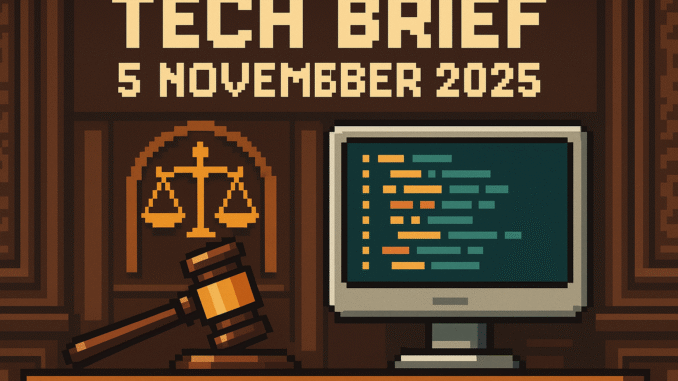
Tech Brief 5 November 2025 opens with the UK’s latest digital crossroads: a court case that could reshape AI, a new digital ID sparking privacy nerves, and a birthday for the technology that made us all mobile. If you missed yesterday’s Tech Brief, you can catch up here before diving in.
AI Firm Triumphs Over Getty Images in Landmark UK Court Ruling
“Training an AI with copyrighted images might sound controversial, but the High Court just declared it onside.” Stability AI, a London-based startup, has won a significant case against Getty Images over the use of copyrighted photographs as data for machine learning. Getty’s claim was that using their stock images for AI training was a breach. The court disagreed. In plain English, UK tech companies now have more freedom to develop AI models without stalling for every legacy copyright dispute.
Legal experts warn this opens the door for more bold innovation, but also risks further unsettling creators already bruised by digital disruption. If you ever combed through code snippets on a BBS, this is familiar territory. The old tug-of-war between closed and open access takes on a new guise. The ruling could shape the next decade of digital creativity in Britain and beyond.
UK’s Digital ID Scheme Sparks Data Privacy Fears
How secure is your digital self? The UK government’s new digital ID proposal, designed to tackle benefit fraud and illegal work, is sparking a fresh wave of privacy anxiety. Officials promise convenience and less paperwork, but critics, privacy advocates and experts, raise alarms about centralising sensitive personal data. This isn’t just a technical tweak. If all your interactions with the state rely on one fragile digital credential, a breach or leak can mean real-world consequences.
There’s a generational sting here. Early net culture thrived on anonymity, from IRC nicks to forum callsigns. Now, the ‘real you’ and your digital records are more tightly linked than ever. Ministers say robust safeguards are coming, but many remain unconvinced. Is the trade-off between digital ease and privacy protection truly balanced? Some trust is hard to win back once it’s lost.
Grokipedia Launch: Academics Question AI Reference Reliability
A brand new AI-powered encyclopedia called Grokipedia hit the web this week, but academics are already poking holes in its results. The platform, created by Elon Musk’s team, draws facts from across the internet. Unfortunately, that includes unvetted forum posts and chatroom chatter. Experts say Grokipedia routinely confuses gossip for gold-standard knowledge. One test uncovered misattributed university degrees and invented historical events.
The risk is obvious: who controls information online, people or algorithms? Wikipedia debates have always been messy, but a system that blurs fact with folklore is another level of chaos. The next time you’re tempted by Grokipedia’s confident tone, remember that sources matter and human oversight is rarely optional. As the digital ID discussion highlights above, it is worth pausing before trusting the first answer you see.
Strike 3 Holdings’ Lawsuits Ignite Copyright Concerns in the Digital Age
Fact: a single US porn company, Strike 3 Holdings, has made millions launching copyright lawsuits against alleged file-sharers. Their target list includes thousands of ordinary users flagged through ISP records. Threatening letters arrive, demanding up to $119,000 (£96,000) per video downloaded, sometimes to innocent parties caught in the net. The practice stretches copyright law to its limit, using legal threat as a profit engine.
Unlike the open-source dream of the 1990s, today’s web can feel like a minefield of traps laid by copyright holders. Even if you have never set foot on a peer-to-peer service, there’s a chill in the air. Small detail: forums lit up in the old days when an innocent download landed you in hot water, but the legal firepower is on another level now. If you get a letter, expert advice is a must.
From the Wayback Machine
On This Day: 2001, Vodafone made the UK’s first commercial 3G phone call using Ericsson’s WCDMA network gear. At the time, mobile internet was a fuzzy daydream for most people. WAP sites struggled with mostly monochrome displays, and data costs bordered on the surreal. This call broke ground, showing that ‘always-on’ mobile connections would become normal. Within two years, 3G’s arrival paved the way for streaming, endless messaging, and the app obsession. Big milestones rarely feel as important as they later become.
This Stuck With Me
Tech Brief 5 November 2025 finds us debating the same issues that shaped internet culture at the start: access, privacy, and the fight to keep machines working for, not against, their users. Today’s headlines feel more personal when you know what freedom used to mean, and what it still could.
Stay curious, keep your soldering iron handy, and never stop challenging the “official” version. Sometimes the best ideas are the ones you build yourself.
Missed yesterday’s Tech Brief? Catch up here

Leave a Reply